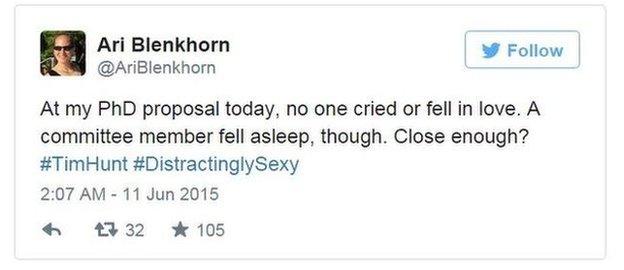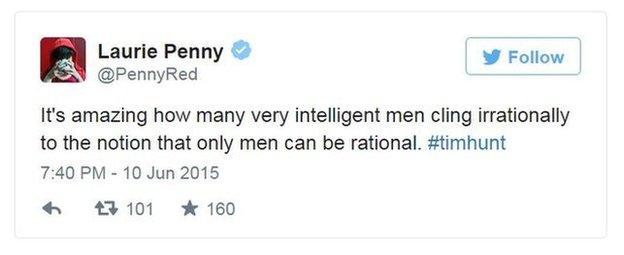Sir Tim Hunt resigns from university role over girls comment
- Published
- comments

Sir Tim Hunt was speaking at a conference in South Korea
A Nobel laureate has resigned from his position as honorary professor at a UK university after he made comments about the "trouble with girls" in science.
University College London (UCL) said, external Sir Tim Hunt - a Royal Society fellow - had resigned from his position within its faculty of life sciences.
He told a conference that women in labs "cry" when criticised and "fall in love" with male counterparts.
He told the BBC he "did mean" the remarks but was "really sorry".
A statement from the university read: "UCL can confirm that Sir Tim Hunt FRS has resigned from his position as honorary professor with the UCL faculty of life sciences following comments he made about women in science at the World Conference of Science Journalists on 9 June.
"UCL was the first university in England to admit women students on equal terms to men, and the university believes that this outcome is compatible with our commitment to gender equality."
Sir Tim Hunt suggested 'girls' should stay out of the laboratory because they distract men
Sir Tim, 72 - who was awarded the Nobel prize in physiology or medicine in 2001 for his work on how cells divide - reportedly told the conference in South Korea: "Let me tell you about my trouble with girls.
"Three things happen when they are in the lab: you fall in love with them, they fall in love with you, and when you criticise them they cry."
'Emotional entanglements'
Speaking to BBC Radio 4's Today programme on Wednesday, Sir Tim said he was "really sorry that I said what I said", adding it was "a very stupid thing to do in the presence of all those journalists".
The British biochemist, who was knighted in 2006, said the remarks made at a conference in South Korea were "intended as a light-hearted, ironic comment" but had been "interpreted deadly seriously by my audience".
He went on to say he stood by some of the comments.
"I did mean the part about having trouble with girls," he said.
"I have fallen in love with people in the lab and people in the lab have fallen in love with me and it's very disruptive to the science because it's terribly important that in a lab people are on a level playing field.
"I found that these emotional entanglements made life very difficult.
"I'm really, really sorry I caused any offence, that's awful. I certainly didn't mean that. I just meant to be honest, actually."

Reaction on Twitter






Imran Khan, chief executive of the British Science Association, said the comments were "frustrating".
"Sadly, dealing with sexism and other forms of discrimination are a daily reality for many people, and I imagine it's hard to find Sir Tim's comments funny if you've been held back by systemic bias for years - whether those remarks were intended as a joke or not," he said.
Aoife McLysaght, professor in genetics at Trinity College Dublin, told the BBC: "It's very unsatisfactory when someone apologises for causing offence rather than for the view they hold."
Prof McLysaght also said: "If he has trouble controlling emotions around women, he should work on controlling his emotions rather than suggest that labs are segregated."
Emily Rice, an astrophysics professor at the College of Staten Island in New York, said she had been "fairy lucky" in her career.
But she added sexist attitudes were "ingrained".
Prof Rice said: "We know how to be objective, we know how to be rational, we know how to be logical when it comes to our data, and we're not always as good about doing that about ourselves."
- Published12 June 2015

- Published11 June 2015

- Published10 June 2015

- Published10 June 2015
